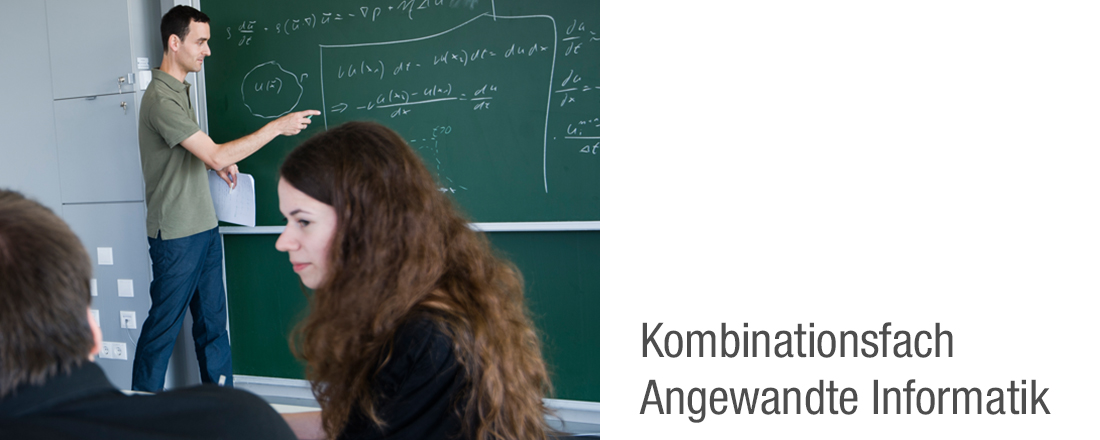Minor subject Applied Computer Science - Multimedia
Internet use and programming, object-oriented programming, web design, and multimedia teaching and learning, mathematical reasoning, and the basics of computer science are central topics of this minor. The minor subject "Applied Computer Science - Multimedia" is therefore by no means limited to manual-technical skills in dealing with the Internet or with multimedia software. Rather, it requires students to be willing and able to engage with mathematical and logical contexts from the very beginning. Only those who – with the support of the courses provided in the curriculum – acquire the ability to work with formal structures in a sovereign and calm way will be able to succeed in this minor.
For degree programmes:
- Bachelor English Studies
- Bachelor German Studies
- Bachelor Theatre & Media Studies
- Information on the profile of the minor subjectHide
-
I. For prospective bachelor’s students of the minor subject Applied Computer Science - Multimedia (AIM)
- The basic requirement for all potential and current bachelor’s students with the minor subject AIM is that they must have a certain mathematical interest and understanding. This is not primarily mathematics in the school sense (curve discussion, differential calculus, etc.), but rather a basic approach to mathematical ways of thinking and structures. Interest in mathematical approaches must be present in order to stay on the ball in this minor subject.
- If you have an aversion to comprehending mathematical processes and to independent mathematical work, the minor subject AIM is not recommended.
II. for first-year students who fulfil these conditions
- In the first semester it is very important to realize that the prescribed courses are not just one-time introductions that may be forgotten afterwards.
The courses in the minor subject that must be taken in the first semester are "Thinking in Structures I" and "Basics of WWW Use and WWW Programming".
- "Thinking in Structures I" has a basic character. The contents taught are not necessarily covered in school (e.g. Boolean algebra), but they are covered in the AIM programme two or three semesters later. The introduction builds on general mathematical school knowledge with important aspects of mathematics that later facilitate access to a programming language.
- The lecture and tutorials on "Fundamentals of internet use and internet programming" initially have nothing to do with real mathematics. The focus here is on the learning process, up to and including the confident use of the newly learned tools. The tool "HTML" requires only low mathematical competence, but a relaxed approach to logical thought processes, which are fundamental for this minor subject, is expected.
Therefore, it is also appropriate to complete the compulsory tutorial independently. Only in this way can the right approach be worked out and timidness with regard to the medium of the Internet disappear. The oral examination, which is at the end of this first lecture, requires admission to this examination. Admission is achieved by earning 50% of all points. The examination is based on the tutorials or arises from them.
- NOTE: It is important to realize that the mathematical part of this minor subject should not be underestimated. For this reason, the first semester with the above-mentioned courses should not be understood as the sole benchmark for the following semesters.
- Up to the end of the second semester, it is possible to change one’s minor subject if necessary. Therefore, if doubts arise at the beginning of the second semester, e.g. in view of the stronger weight of mathematical thinking compared to the first semester, it is advisable to make a decision as soon as possible.
If the basic willingness to think in abstract mathematical structures is present and the interest is great enough, regular participation in the obligatory tutorials can help to dispel such doubts.
Credits from other degree programmes: Prof. Dr Alfred Wassermann
- The basic requirement for all potential and current bachelor’s students with the minor subject AIM is that they must have a certain mathematical interest and understanding. This is not primarily mathematics in the school sense (curve discussion, differential calculus, etc.), but rather a basic approach to mathematical ways of thinking and structures. Interest in mathematical approaches must be present in order to stay on the ball in this minor subject.
- CurriculumHide
-
Module SWS LP 1 Thinking in Structures I
V+Ü Thinking in Structures I
2
32 Thinking in Structures II
V+Ü Thinking in Structures II
2
33 Multimedia Competence
V+Ü Basics of WWW use
and WWW programming
V+Ü Multimedia Teaching, Learning
and Design
Total credit points
4
2
7
3
104 WWW Programming I
V+Ü WWW Programming I
2
45 WWW Programming II
V+Ü WWW Programming II
2
46 Introduction to Computer Science
V+Ü Introduction to Computer Science
6
97* Programming in Java
V+Ü Programming in Java
4
68 Multimedia Systems
V+Ü Multimedia Systems I
3
59 Subject-specific module A
V+Ü Artificial Intelligence I
3
5Total 30 49 *Programming in Java is no longer offered. The course has been replaced by Human-Computer Interaction I.
- Examination regulationsHide
-
Examination regulations for the minor subject Applied Computer Science - Multimedia Bachelor's programmes at the
University of Bayreuthin the version of 05. June 2020 open/download PDF Examination regulations for the minor subject Applied Computer Science - Multimedia Bachelor's programmes at the
University of Bayreuthof 30 April 2018 Older versions of the examination regulations can be found here -> ...more - Module HandbookHide
-
Module Handbook valid as of WS 2018/2019 ...more - Subject area advisorHide
-

Prof. Dr. Michael Guthe
Phone: 0921 / 55-7601
E-Mail: michael.guthe [@] uni-bayreuth.de
Office: 0.05 (EG)
Building: Angewandte Informatik

